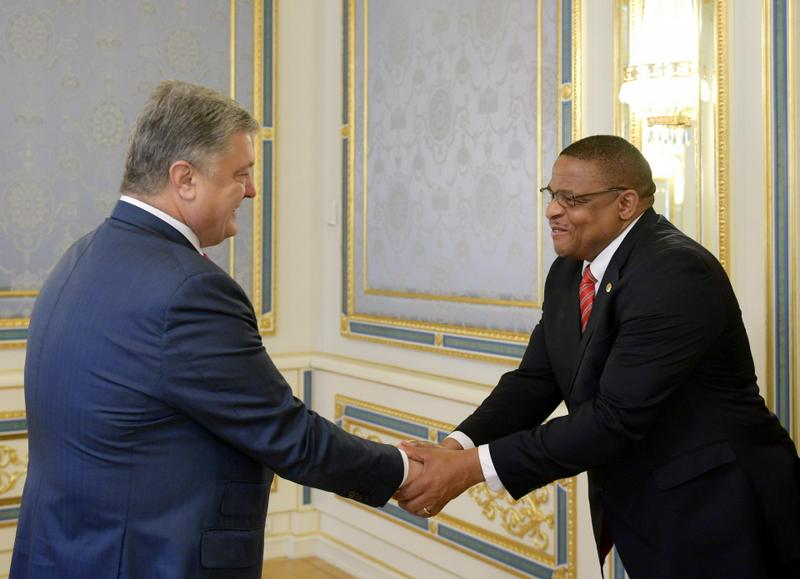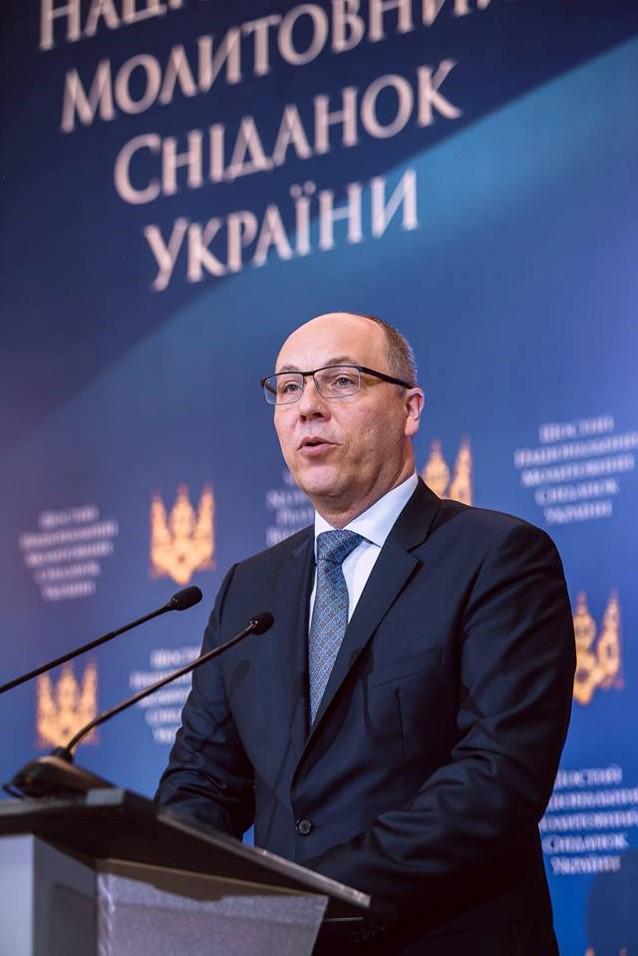Gvardeisk - A new Cold War is approaching and the Baptist World Alliance (BWA) together with its European Baptist Federation (EBF) is making its geopolitical preferences clear. In his talk before the Parliament of Word Religions in Toronto on 3 November, the WBA's General-Secretary, the Texan Elijah Brown, defended Kiev in the armed conflict in the country's East. Without mentioning the Russian Patriarch Kirill by name, Brown accused him of using the protection of religious faith as an excuse to support the Eastern faction in the on-going Ukrainian conflict. In this speech, he cited the meetings in Kiev on 4 October between the heads of these two Baptist organisations and President Petro Poroshenko and Andriy Parubiy. Yet Brown only mentioned Poroshenko by name; Parubiy is the Parliament's President and the country's highest-placed fascist. He and Oleh Tyahnybok joinyly formed the "Social-National Party of Ukraine" in 1991. A meeting with Parubiy is therefore to be judged morally versus a gathering with Poroshenko or Vladimir Putin.
Following the meetings on 4 October, President Poroshenko's website published the photo of an intense, three-handed handshake between himself and the South African Paul Msiza, the BWA's President. According to a release by the EBF, Msiza stated on that occasion: "We are here today to show solidarity with the Ukrainians." At the meeting, Poroshenko thanked Baptists for their support of the (West) Ukrainian army. According to the President, Ukrainian Baptists should contribute to the military's psychological and moral strength. A group photo of the meeting with Parubiy was also published. He had spoken previously at the country's National Prayer Breakfast in Kiev on June 1, 2017.
A few days previous, from 26 to 20 September, the EBF's annual Council had convened in Lvov/Western Ukraine. This gathering of 160 church delegates stood under the motto "Reconciliation in Christ". Yet there was no public indication of any attempt to enter into dialogue with state representatives across the frontline in Eastern Ukraine. An EBF-release from 3 October borrowed a phrase used by Petro Poroshenko when it spoke of "temporarily occupied territories". Not mentioned was the fact that significant gunpowder and ethnic cleansing would be needed to return that territory to Kiev's rule. No release by this conference mentioned the sole Christ-based solution to the conflict: a re-unification achieved through mutual concessions at the negotiating table.
The supporters of Kiev can of course rejoin that. Despite all the expressions of good intent, the other side is not open to dialogue. It is true that not even I, despite repeated efforts, have been able to visit the republics of Donetsk and Lugansk. My US-passport automatically raises mountains of distrust. Yet the representatives of Donetsk and Lugansk have reasons for their reserve. It would be extremely naïve to assume that Kiev is strictly good, and Moscow strictly bad.
On October 15th, only days after the meetings in Kiev, all Protestant confessions in the Lugansk Republic were declared illegal. A connection between these two events cannot be ruled out. Church representatives holding Russian passports will now be called to travel to Lugansk, calm the waves and attempt to dampen the severity of the measures directed at the region's Protestants.
Word-of-mouth reports state that the Baptist Olexander Turchynov, once Ukraine's Interim-President and now its Secretary for Security and Defence, is offering to supply the country with a new, robust and well-off Evangelical Alliance.
This would indeed be part of the drive to repeat the strategy of the initial Cold War: retreat into the halls of Western power and attempt from that position to decry the repression of Protestants living in the territory located between Brest and Hong Kong. Or to put it in another way: Flee to the West in hopes of helping those in the East more effectively. That's the most comfortable - though by no means the most potent - means of supporting religious liberty. But such choices raise an even more significant question: can a faith restricted to a single world order get close to manifesting the essence of the Gospel?
The evangelist Franklin Graham, a supporter of Donald Trump, continues to crash the consensus by attempting to expand relations between Western Protestants and the Russian world. Unofficial reports state that his son, Will Graham (born 1975), will be visiting the "New Life" church in the Moscow area at the end of November. This local church has been started and still led by Mats-Ola Ishoel, a Norwegian from Sweden and long-time resident of Russia.
Events happening elsewhere in Moscow
The staff at the Moscow headquarters of the "Russian Union of Evangelical Christians-Baptists" has been slashed by more than half during the past 15 years. The Union leadership headed by Peter Mitskevich since last April has continued to release staff or simply not filled existing positions and service departments. Yet the small, new leadership team appears gifted in its relations with Ukraine. It has visited Kiev twice since last April. Mitskevich was the first president of the Russian Union in many years to visit the EBF'S annual conference, held this time in Lvov.
The unexpected came about between October 26 and 28 when Union leadership from Moscow and Kiev jointly visited a conference on the now Russian-controlled Crimean peninsula. Senior Vice-President Viktor Ignatenkov arrived in Yalta from Moscow. Igor Bandura, Vice-President of the Ukrainian Union and a committed defender of pro-Kiev positions, arrived on foot across the frontier between the Ukraine and the peninsula.
As a result of the dispute regarding membership in the Kiev or Moscow Union, Crimea's Baptists had split officially on July 7, 2015. At that time, 39 congregations belonged to the pro-Kiev group while another 28 had vouched for Moscow. Now, in Yalta, Pastor Veniamin Yukhimets was re-elected head of the pro-Kiev faction. The Kiev Union's stance expects that all congregations in Crimea remain allied with Kiev. The Moscow Union attempts to place this decision in the hands of the individual congregations.
Commentary from Yoder:
It was not until 1969 that the United and Lutheran churches of East Germany managed to found an independent federation of churches separate from West Germany's evangelical church "EKD". This recognition of the status quo had almost strictly positive consequences for the new federation. Despite Yukhimets' re-election, a change of heart among Crimea's Baptist can hardly be expected to require 24 years. A large segment of congregations has already made its peace with reality. The situation is much more complicated in Eastern Ukraine, for a return to Kiev authority cannot be ruled out there. The Kremlin's stance on Crimea and Eastern Ukraine are by no means identical.
Syria
Officially, in the name of humanitarian concerns, Baptist Union President Peter Mitskevich and his Director of Administration, Vladimir Miskevich, visited Syria at the end of October. The visit can be interpreted as an indication of trust on the part of the Kremlin. Speaking excellent English and with years of experience as rector of Moscow's Baptist seminary under his belt, Mitskevich is better equipped than his predecessors to perform diplomatic work beyond the borders of Russia.
Yet this was not the first visit to Syria by a Russian Protestant leader. Already in February, Sergey Ryakhovsky, the omnipresent Bishop of the "Associated Russian Union of Christians of Evangelical-Pentecostal Faith" (ROSKhVE), had visited the war-torn country as part of an inter-religious delegation. Many regard the Pentecostal Ryakhovsky as the first-among-equals under the Protestants of Russia.
Various Orthodoxies
On October 15, 2018, the Moscow Patriarchy (the world's largest Orthodox church) and the „ecumenical" Patriarchy of Constantinople officially broke ties. Moscow no longer accepts Constantinople as the umbrella for all Orthodox confessions. This has wide-ranging consequences for all Orthodox churches, especially for the smaller ones scattered throughout the Western diaspora. One will now be forced to put all cards on the table and clearly state whether one is loyal to Moscow or Constantinople. The Moscow Patriarchy has until now been Ukraine's largest Christian confession; a mighty struggle to retain or gain ownership of real estate will (need to) take place.
Russia's Protestants are essentially at a loss to already assess the consequences of these developments. To me it would now seem easier for the Moscow Patriarchy to express support for the policies of the Kremlin. The Russian Patriarch Kirill was not even present at festivities marking the acquisition of Crimea by Russia on 18 March 2014. It is now to a large extent no longer necessary to take the sensitivities of the Ukraine-based Orthodox churches into account when deciding policy. The Moscow Patriarchy can now afford to be less international; it will become less present on both sides of the barricades. That could well have negative consequences for the Protestants of Russia. The desire for survival would demand that Protestants now seek even more diligently dialogue with the Orthodox powers of their country.
(The article was originally released on 13 November 2018 and CCD reprinted with permission.)












